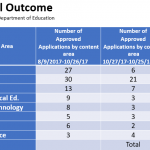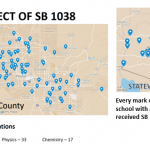Well, anyone who reads my blogs probably knows my opinion about school-choice (I think it’s a wolf in sheep’s clothing that is defunding public schools and segregating Arizona kids by race, ethnicity, and SES). There are three paths to school choice today: public, charters, and private school vouchers (referred to as Empowerment Scholarship Accounts, or ESAs, in Arizona). I have accumulated some interesting stories about ESAs in the last few weeks.
First, I will tell you a bit about the ESA program. As defined in Arizona Department of Education’s brochure, an ESA is “An alternative to public school…to provide options for parents to freely choose how and where to educate their children with financial assistance from the state” (p. 1). There are criteria to be eligible, as specified in the brochure, and students receive anywhere from $2,000-30,000 annually to attend a private school of the parents’ choosing. The ESA program began in 2011, and continues to expand today. Instead of paying the cost for a child to attend a public school, the state awards the funds to families for private school tuition. People applying for these scholarships do not even have to prove financial need. There is a comprehensive report about ESAs, completed in 2013, available if you are interested in reading further. Considering that private schools are rated no better and sometimes worse than public schools, it all makes me sad. I think that parents are being misled by ESAs.
Some may remember that the ESA program created quite a stir with the robo-call scandal last year, but these last two weeks the ESA program has been creating quite bit of drama in my local school! The drama began when an ESA Liason gave lots of misinformation to two of my families. In one example, the Liason told a family that a re-evaluation was required by the child’s fifth birthday (when in actuality, re-evaluations are due prior to starting kindergarten). In another example, the Liason told a family that the school district of last attendance was required to do the evaluation (contradicting the ESA website that evaluations are conducted based on private school location). Additionally, the Liason told one family to have us guess about what the eligibility should be instead of conducting an evaluation. (That is not in the best interest of the student at all!) To me, the worst part of all was a comment the Liason made in an email: “If you receive any sort of push back from the school please feel free to give my information to them and they can contact me to clarify their obligation to re-evaluate (student).” It made me feel sad that this person, representing the ESA program, would set an expectation that the family should expect trouble. My team cares a lot about our students—and kids in general. Given the tone of the Liason’s email, it was challenging to clarify truth for the families and (happily) arrange a thorough, professional evaluation for these awesome kids within a reasonable timeline.
The whole experience left me thinking a lot about this ESA program and how it is affecting kids and schools. One topic of concern is that the ESA program is pulling money out of my local school district, giving it to private schools, and then demanding that my school use resources (professional staff) to evaluate kids that private schools cannot evaluate. Given the defunding of public schools, I wonder if public schools will continue to have staff funding to meet these obligations in the future. I think private schools should consider their own solutions for student evaluations with the funding the state provides in the ESA scholarship. Further, I have been thinking about whether private schools are equipped to provide adequate services for children with special needs. I believe that my students are entitled to a Free and Appropriate Public Education (FAPE) that promotes their academic progress. I wonder if some parents are throwing out the “appropriateness” of their child’s education in order to attend a private school that may not offer necessary accommodations and modifications to best serve their child. If appropriateness of services affects the child’s outcomes, then lack of appropriateness concerns me greatly because statistics show that people with disabilities are already over-represented in the prison system. I want my students with disabilities to have adequate services that give them access to grade-level curriculum and opportunities to be successful in the community. And I want their parents to make an informed decision about where that education will take place.
Overall, I believe that parents are entitled to decide where their child goes to school. However, it concerns me that private schools can choose their own curriculum, hire uncertified teachers, and escape many of the accountability measures in place for public schools. For those choosing private, I agree with authors who suggest that private schools are only a benefit if they provide religious education that is not available at a public school. It’s a difficult decision that should be made for each child with careful consideration. As for me and my school, I just hope future ESA Liasons set parent expectations for a smooth collaboration instead of misinforming my families and creating chaos for those left to sort out the process for the kids I love.










Comments 4
Well said, Jess! I couldn’t agree more if we were the same person (and sometimes I think we are!)
I was at an event with five legislators on Saturday, and one of them said that we can expect a big push coming from the state legislature for expanding the ESA program. That’s alarming.
We need to stay in contact with our legislators about this issue.
I have three comments. First I’ve heard Huppenthal talk about the ESAs and each time he talked about how few parents take advantage of them. That seemed so disingenuous – to defend a program you support by saying no one’s using it. Second, it’s widely commented that private schools and charters don’t play by the same set of rules that traditional public schools do and that its’ unfair. It’s a just observation, but I don’t get why those making the comment always seem to want to reign in the freedoms of private schools or charters rather than loosening the binds on public schools. Third, it seems terribly arbitrary to suggest that private schools’ only benefit to students is when they provide religious instruction. I have a friend who teachers at a private girls school in the east whose mission it to empower women. What would you say to him? Beyond that, I think plenty of parents choose a private or charter school because the specific public schools they can choose from are so bad rather then some opinion about the general state of public schools.
Hi, Sandy! interesting comments. I think that the author I quoted about “private schools only benefiting students if they provide religious instruction” was referring to the fact that many private schools do not provide an education equivalent to public school (whether that has to do with curriculum selection, hiring of certified teachers, etc). She was making the case that, generally speaking, public school is a safer bet than private school unless parents are choosing private because it offers religious education opportunities. You make a good point that there are private schools with other additional programs, such as girl empowerment. I think I will amend my opinion to say that I somewhat agree with the author: Private is only a better choice than public if it offers a program that is not available at the public school. Otherwise, I think that private schools can be highly unregulated and should only be selected after very careful consideration by the parent. Private is rarely ever better just because it is “private.” I think that is a myth and parents should do their homework.
To add on to this story: Interestingly, one of the parents who is being evaluated through our school resources found out that she needs glasses for her daughter. Her private school could not offer any assistance in this matter. However, our public school nurse was able to put her in contact with the local Lyons club that provides glasses vouchers for families who cannot afford them. I think this is another illustration of private schools lacking the resources to serve students in the ways that public schools serve students. What will happen if private and public charter schools squeeze non-charter publics out of the marketplace? Who will serve the diverse needs of students and families?